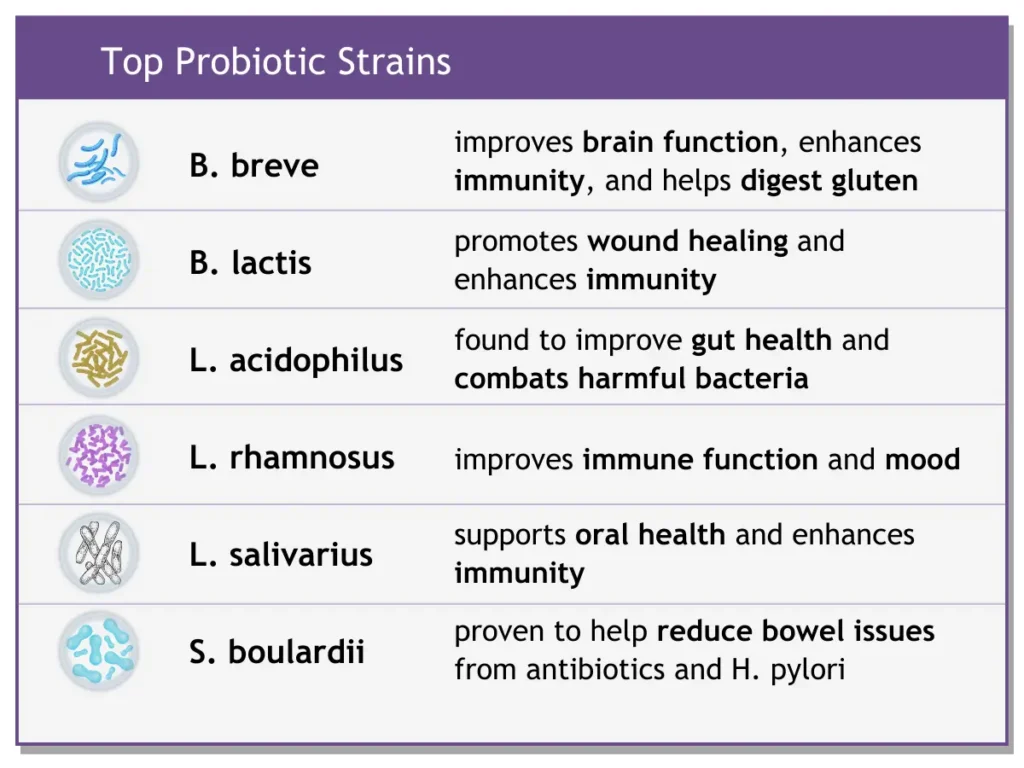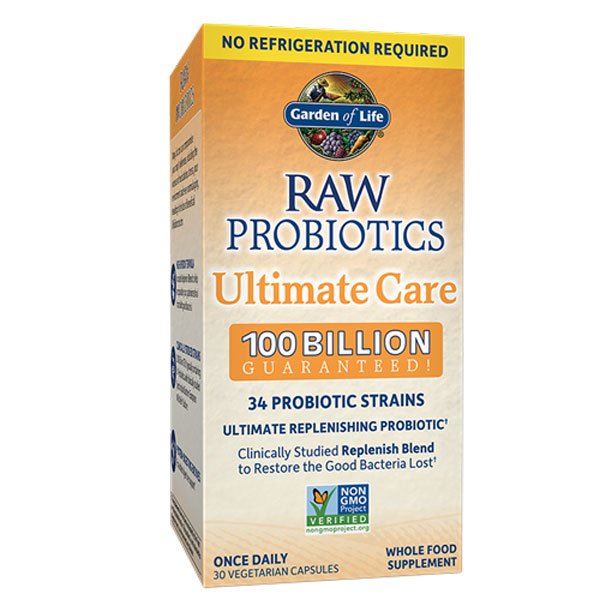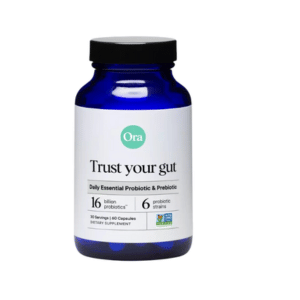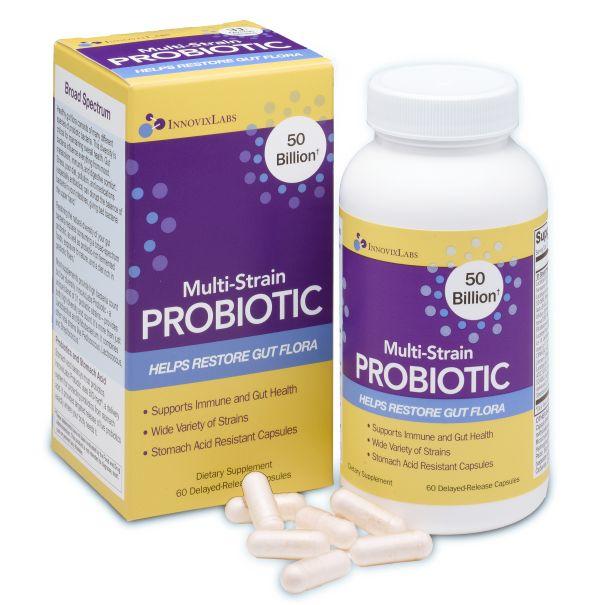
SPONSERED ADVERTISING CONTENT* Learn more.
5 Probiotics That Will Rebuild Your Digestive and Immune Health
The research behind the fastest rising gut health supplement in the world.
You’ve tried dieting and changing your lifestyle – but you still feel exhausted, bloated, and backed-up.
The problem for you, and countless others, is that you haven’t addressed the root of the problem – your gut health.
Stress, travel, pollution, an unhealthy diet, antibiotics – all of these can cause significant damage to the healthy bacteria (probiotics) in your gut.
The food you eat alone is home to a cocktail of antibiotics, preservatives, and additives which slaughter our healthy bacteria.
The resulting imbalance in your gut flora causes radical spikes in harmful bacteria growth.
Your body burns through energy and nutrient reserves and limits other body system functions to focus on fighting off the overgrowth of bad bacteria.
This is a drawn-out battle that can last months or even years. Finding the right probiotic supplement for you – especially in this flooded market – is time and frustration.
That’s why CHR has compiled a comprehensive probiotic supplement guide and a list of the 5 best probiotic supplements on the market.
Symptoms of a Gut Flora Imbalance
- Diarrhea or Constipation
- Negative Mood
- Indigestion
- Bloating
- Cramps
- Mental Fog
- Easily Tired
- Weak Muscles
- Frequently Sick
- Weight Fluctuations
An Effective Probiotic Has:
- Prebiotics – simple nutrient-dense starch – ideally rice/potato flour – to ensure that the probiotics have fuel to establish a successful colony.
- Manufactured cGMP – supplements which are made in a facility that has been certified for quality and hygiene by the FDA.
- High CFU – look for a probiotic with at least 50 billion CFU and at least 4 billion CFU per strain. Lower CFU will have difficulty establishing successful colonies.
- High Strain Variety – look for a probiotic with at least 8 strains. Probiotics work together to tackle a greater number of health issues more efficiently.
- Evidence-Based Strains – look for strains that are backed by concrete research and trials. Type the name of your strain into your internet browser to find research. We’ve listed some highly researched and effective strains below.
Top Probiotic Strains

Probiotic Supplements: What to Avoid
- Low CFU
- Low strain variety
- Bottles that let light in
- Not made in America
- Not lab tested
Top 5 Probiotic Supplements
PROS
- 61 Billion CFU in every capsule
- 11 diverse strains
- prebiotics in every capsule
- High CFU overage
- enteric coated
- zero preservatives or additives
- vegan & gluten-free
- verified by MD, PhD, RDN
- manufactured in cGMP facility in the US
- one capsule per day
CONS
- due to high demand, is sometimes on backorder or sold out
REPORT
BlueBiotics: Ultimate Care is a veritable list of the most researched and proven probiotic bacteria and one of only a handful of probiotic supplements which is continually updated and improved as research in the field of probiotics advances.
This supplement contains 61 billion CFU, 11 diverse strains, as well as an organic prebiotic in every premium Full-Tract acid-resistant capsule. There is only 1-capsule per serving, with no unnecessary fillers, additives, or preservatives.
This product contains an array of clinically studied strains which are not found together in any other lab-grade probiotic, such as Bacillus coagulans and S. boulardii.
Our analysis showed that over 99% of the probiotic colonies in BlueBiotics were living and viable – many capsules even yielded as much as a 17% overage of CFU.
Of the users surveyed for customer feedback, the most common comments were:
- Immediate bloating and indigestion relief
- Increased B.M. regularity
- Over 80% reported improvements to mood, focus, and mental clarity
- Live, attentive customer support reps and no-questions-asked 90-day returns
2. Ultimate Flora
by Renew Life


A
PROS
- 50 Billion CFU in every capsule
- 10 diverse strains
- enteric coated
- vegan & gluten-free
- manufactured in cGMP facility
- one capsule per day
CONS
- refrigeration recommended
- no prebiotic
- not MD verified
- some customer support issues reported
REPORT
Ultimate Flora tested significantly higher than the majority of general probiotic blends. This product is composed of very well-documented probiotic strains and is an effective addition to any lifestyle, capable of conferring a wide variety of health benefits. The probiotic strains are not only diverse, they were also resilient to outside influences and, in many cases, were successful in establishing colonies within the digestive tracts of study participants.
Despite the hefty CFU advertised by Ultimate Flora, a large portion of the probiotic colonies were no longer alive upon analysis. This resulted in the effective CFU being much lower than what was claimed by the product.
3. Raw Probiotics
by Garden of Life


B+
PROS
- 100 Billion CFU per serving
- 34 diverse strains
- zero preservatives or additives
- vegan & gluten-free
- manufactured in cGMP facility
CONS
- not enteric coated
- no prebiotic
- high number of dead cells
- contains strains which are not well-studied
REPORT
Topping the probiotic market numbers at 100 Billion CFU divided between 34 probiotic strains, Garden of Life’s Ultimate Care probiotic was definitely a contender for best probiotic. Free from preservatives and additives, RAW scored impressive marks across the board. Although this shortens the lifespan of the probiotics strains somewhat, buying in small quantities can easily solve this problem and – honestly – at CHR we always prefer purity to additives.
We were a little disappointed to see that this product was not enteric-coated. Although enteric-coating is not necessary for roughly 70% of the cultures in this probiotic, the remaining 30% (probiotics such as Streptococcus Thermophilus) will be devastated by your stomach acids. That is the only real drawback for an otherwise exemplary probiotic.
4. Trust Your Gut
by Ora

B
PROS
- 52 Billion CFU in every capsule
- 11 diverse strains
- contains a prebiotic
- vegan & gluten-free
- manufactured in cGMP facility
- one capsule per day
CONS
- not enteric coated
- not MD verified
- contains fillers
REPORT
Trust Your Gut probiotics contain 11 complex species, including various lactobacillus and bifidobacterium species, which promote optimal digestion and help improve immunity.
The company Ora took the pure approach by leaving out any harmful additives, and only using certified-organic ingredients. Additionally this product is free of preservatives, dairy, soy, tree nuts, sweeteners and is vegan and non-gmo certified.
At $50 per bottle this is one of the more expensive supplements. The capsules are not enteric-coated, which is a key factor in the effectiveness of any probiotic supplement, so that is a major downside. Ora claims that their probiotic strains are stomach-acid resistant/tolerant. This is true of most strains, but an enteric coating will protect 100% of the strains – whereas many of these probiotics will dissolve. Despite the high CFU count, inulin prebiotic source, and strain diversity; Trust Your Gut by Ora was unable to rank higher on our list for these reasons.
Multi-Strain Probiotic
by Innovix Labs

C+
PROS
- 50 Billion CFU in every capsule
- 31 diverse strains
- enteric coated
- manufactured in cGMP facility
- one capsule per day
CONS
- high number of synthetic ingredients
- not MD verified
- no prebiotic
- Low CFU per Strain
REPORT
The 31 strains in this probiotic include complete lactobacillus and bifidobacterium complexes, as well as two variants of the Streptococcus Thermophilus bacterium. Additionally, this supplement features enteric-coated capsules ensuring that your stomach acids won’t eat up the probiotics before they get to your intestines.
The only reason InnovixLabs didn’t outrank a couple other probiotics on this list was due to its worrying amounts of additives, including: Microcrystalline Cellulose, Hydroxypropyl Methylcellulose, and Silicon Dioxide.
Citations*
Dingwell, Jonathan B., John John, and Joseph P. Cusumano. “Understanding the Complexity of Human Gait Dynamics.” Chaos 26, no. 9 (2016): 093112. PubMed Central.
Costa, Madalena, Ary L. Goldberger, and C.-K. Peng. “The Multiscale Entropy Algorithm and Its Variants: A Review.” Entropy (Basel) 17, no. 5 (2015): 952-973. PubMed.
Annavarapu, Akhil, S. John Antony, and Laxmi Prabha Bharath. “An Analysis of Heart Rate Variability during Meditation Using Wearable Devices.” Sensors (Basel) 21, no. 1 (2021): 234. PubMed Central.
Acharya, U. Rajendra, K. Paul Joseph, N. Kannathal, C. M. Lim, and Jasjit S. Suri. “Comparison of Detrended Fluctuation Analysis and Multiscale Entropy Analysis for Investigating Heart Rate Variability during Graded Exercise.” Journal of Medical Engineering & Technology 30, no. 6 (2006): 316-321. PubMed Central.
Maheshwari, Anirudh, Yulia Greenstein, Manish Garg, Akshatha Sunkara, and Pramod Garg. “Multiscale Entropy Analysis of Heart Rate Variability in Neonatal Encephalopathy.” Pediatric Neurology 125 (2021): 22-29. PubMed Central.
*Citation sources are not affiliated with consumershealthreport.org in any way – they are used for research purposes only.









